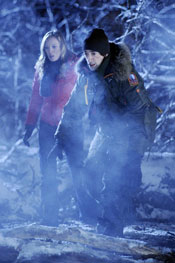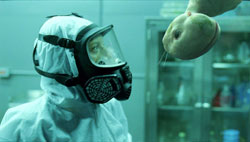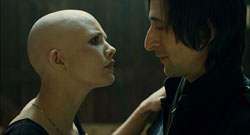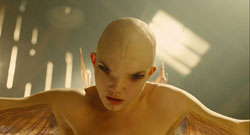Splice is a modern-day variation on Frankenstein: what happens when science makes an unnatural form of human life. In Mary Shelley’s classic novel, the creature is a re-animated bundle of human body parts that, contrary to many popular re-tellings of the myth, has a keen intelligence. Nonetheless, his hideous appearance denies him a place in human society. The story raises questions of science’s boundaries and what it means to be truly human.
In Splice‘s 21st-century scenario, the featured creature arises not from a patchwork of human remains, but instead from a genetically engineered blend of animal and human DNA. This premise, which sets us up to wrestle with some of the same questions, is all the more relevant in light of today’s advanced bio-engineering technology and debates about human cloning.
Unfortunately, Splice is more in the tradition of the popular Frankenstein myth than it is Shelley’s original, diminishing the human nature of its monster in favor of its brutish nature. This amplifies the surface-level horror, but it glosses over the weightier questions of tampering with human nature. For all its seeming ethical import, Splice shocks us not to make us think, but just for shock’s sake.
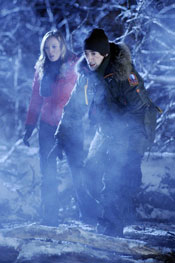
The creators of this part-human, part-animal being are Clive (Adrien Brody) and Elsa (Sarah Polley), the Brangelina of bio-engineering. At the film’s beginning, they successfully engineer a new hybrid animal species that looks like Flubber and promises a wealth of disease-fighting proteins for the pharmaceutical company they work for, NERD (Nucleic Exchange Research & Development).
Flushed with success, Clive and Elsa go to their corporate boss and pitch their most ambitious plan yet: throw human DNA into the mix. As they see it, the right human-animal hybrid could yield the real medical goods—cures for cancer, even. But their boss isn’t interested. She wants them instead to find ways to capitalize financially on what they’ve created so far.
Clive and Elsa pretend to go along with their orders, but behind the scenes they go to work on their dream creation. At first they tell each other that they just want to see if they can successfully do it, if they can Splice the DNA together—they won’t even go on and fertilize the egg. But when they succeed, Elsa (for reasons not fully apparent until later) presses Clive to take it one step further, and again and again until they have a mysterious, illegal, and rapidly maturing new creature under their care, which they dub “Dren” (“NERD” backward).
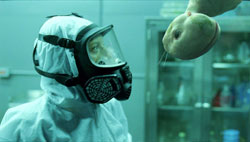
“Clive and Elsa are smarter than they are wise,” says Splice director and co-writer Vincenzo Natali, “and while they play with the building blocks of life, they don’t really have any deep understanding of what life is.”
This is a generous assessment of their characters. After all, you might expect that, on the verge of doing something so wildly controversial, the brilliant Clive and Elsa would first have some semblance of a nuanced debate. In these early conversations, the film could have actually developed some of the ethical issues at stake. Instead, Clive is rather easily won over by platitudes from Elsa like “scientists push boundaries—at least the important ones do.” Which essentially sounds like, “Clive, scientists don’t ask hard questions; they push the plot along.”
Conversely, I’m sure Natali would take issue with my assessment of the creature Dren as not being human enough. “I wanted a creature whose humanity we fall in love with,” he says. That’s why they cast a real actress (Delphine Chanéac) to portray her (yes, it’s a “she”), only using CG to tweak her facial features and add animal appendages. Technically it’s very impressive. But the humanity doesn’t come through enough, for at least two reasons.
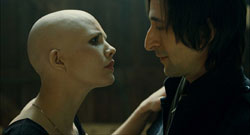
First is the creature design. Visually, the most distinctively human and relational part of our bodies is the face, and Natali’s team departs a little too much from the template here, making Dren something entirely not human. Also, as much as anything else, it is our capacity for language that separates humans from animals, but Dren barely exercises any such faculties. It would have been its own kind of challenge, but to me this seems a missed opportunity. (On the other hand, consider how human a mere plastic bag becomes when given Werner Herzog’s voice.)
Second, probably due to his stated goal “to create something shocking,” Natali uses sex much too rashly with Dren’s character. I never expected a horror film with scientists splicing DNA willy-nilly and then reaping the horrific consequences to spark many belly laughs. But as I sat through what was intended to be easily the most shocking moment in the film—a graphic sexual encounter between Clive and his part-human, part-animal creation—the audience around me howled with delight. To many of them, Natali’s “shocking” scene was just a hilarious sexual gag.
In fact, it was a ludicrous narrative contrivance in very bad taste. But either way, Natali miscalculates. Sex seems an easy way to be edgy, but the reality is that people are conditioned to see sex as usually either glamorous or funny. If Natali wanted to use Dren’s sexuality to express her humanity and, especially with Clive, provoke questions about the ugly reaches of human desire, a more understated approach might have gone much further.
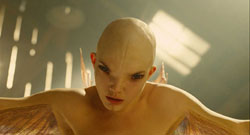
Ultimately, from an ethical standpoint, Splice looks much more at how Clive and Elsa deal with their creation than it does whether they should have created in the first place. They develop a parent-child bond with Dren, a bond that is at the same time experimenter-subject, master-pet, and eventually something much worse. Through all of this, the film suggests that the scientists’ human nature—and not so much Dren’s conflicted nature—is the wild card that makes this scientific innovation dangerous.
There is truth to this caution, but aside from the fact that the story’s ever-increasing absurdities undermine any such message, it is stunning that the film doesn’t take more seriously the first question of: should they have created? If in Splice we had been forced to confront a creature that, while being wholly different, was more recognizably human, then that might have been truly shocking.
Talk About It
Discussion starters- What does our status as God’s image-bearers mean for the way we can (or should) handle human DNA?
- How are humans like the rest of creation? How are we unique?
- If science were to create a human-animal hybrid like Dren, would this creature be made in the image of God or not? Discuss.
- Why are many people opposed to human cloning? Are the objections rooted more in foundational beliefs or scandalized sensibilities?
- What do Elsa’s actions have to say about contemporary attitudes toward having children?
The Family Corner
Splice is rated R for disturbing elements including strong sexuality, nudity, sci-fi violence, and language. Dren’s character is a little unsettling to watch, due to her strange appearance and unpredictable behavior. The language, which includes a number of f-words, will probably be the least of a parent’s concerns. There is some violence, but little that is particularly graphic. The sexual content is by far the biggest issue; there are three sex scenes. One is between two humans and has no actual nudity. The second (referenced above) is extremely graphic and has the added distaste of being between a human and the not-fully-human Dren. The third does not have any actual nudity, but has the same cross-species distaste as the second, and all the more so because it is a rape. In addition, there are a couple more instances of nudity.
Photos © Warner Bros.
Copyright © 2010 Christianity Today. Click for reprint information.

